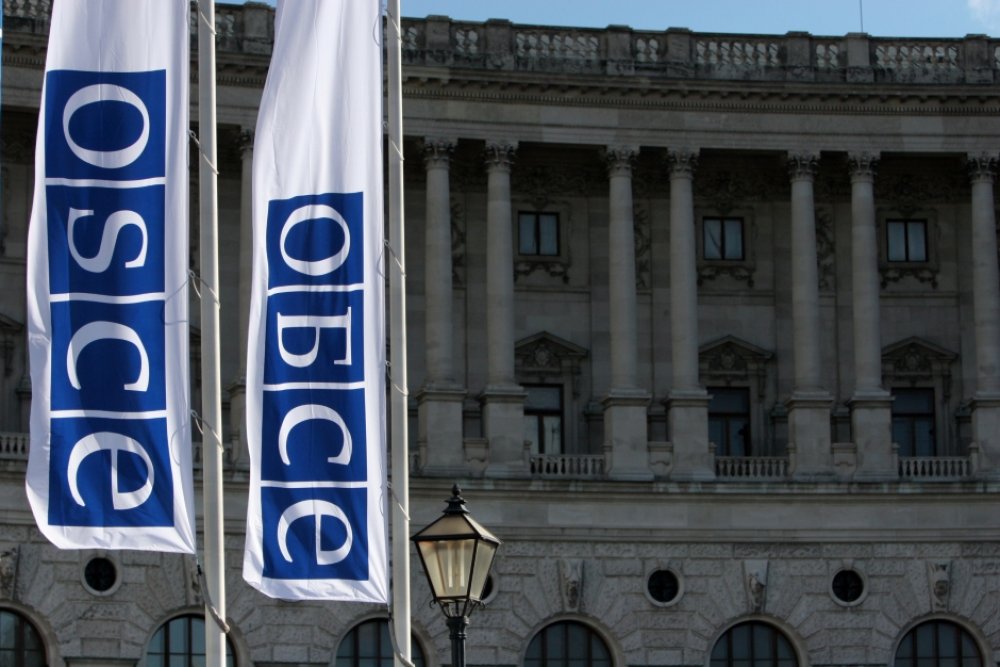Photo: adamr/FreeDigitalPhotos.net

The Upcoming OSCE Ministerial Council Meeting in Belgrade: No Reason to Celebrate
The 22nd OSCE Ministerial Council (MC) will meet on 3 and 4 December in Belgrade, Serbia. The MC meeting, which takes place once a year in the country holding the OSCE Chairmanship, is attended by foreign ministers or their representatives from the 57 OSCE participating States as well as from the 11 Partners for Co-operation.
The Belgrade MC meeting was originally supposed to be a significant meeting at which OSCE participating States had hoped to commemorate the 40th anniversary of the signing of the 1975 Helsinki Final Act with the successful conclusion of the so-called Helsinki+40 process and the adoption of a landmark OSCE document. OSCE states had planned to adopt a document that would provide strategic guidance for the Organization’s future role and for the setting up of a “common and indivisible Euro-Atlantic and Eurasian security community”, a vision that OSCE Heads of State had agreed to by consensus at the 2010 OSCE Astana Summit.
Political realities have changed significantly since 2010, however. While East-West relations had already been strained prior to the Ukraine crisis, tensions rose significantly when Russia annexed the Crimean Peninsula in March 2014 and started to support the rebellion in eastern Ukraine.
Hence, OSCE states don’t have much reason to celebrate in Belgrade.
Instead, they have to face the reality that principles and commitments contained in the OSCE’s founding document, the 1975 Helsinki Final Act, have been violated in the course of the Ukraine crisis. These relate for example to the inviolability of borders and the territorial integrity of states.
Yet, the importance of the Belgrade MC meeting should not be underestimated. More than 40 ministers have confirmed their attendance and the meeting will thus provide a much needed opportunity for OSCE states to engage with each other during times of political differences. The meeting will offer a chance to discuss the OSCE’s role in the management of the Ukraine crisis as well as the future of Euro-Atlantic security. In this regard, the implementation of the Minsk Agreements, the importance of the OSCE Special Monitoring Mission to Ukraine and of the Trilateral Contact Group will be high on the agenda of foreign ministers.
Against this background, a cautious prediction can be made as to which declarations and decisions have a chance of being adopted at the MC meeting in Belgrade. A number of draft documents are currently under negotiation in the respective OSCE committees in Vienna. Many of the negotiations will likely drag on into the night and right up until the last minute before consensus can be reached.
The Serbian OSCE Chairmanship has drafted and circulated a political declaration that includes particulars on the Ukraine crisis. A first round of discussions in Vienna revealed that basic divisions on how to interpret the root causes of the Ukraine crisis remain and seem even to have deepened. An adoption by consensus of a political declaration at the MC in Belgrade is therefore highly unrealistic.
The Serbian Chairmanship has also circulated a text on the post Helsinki+40 dialogue. Such a decision would acknowledge the process thus far, recognize that the 2010 Astana vision could not be implemented and therefore call for a continuation of dialogue. The aim is to create an open-ended and inclusive dialogue with no formal framework and no formal deadline. All 57 participating States are under intense political pressure to adopt a document on the continuation of this dialogue, which will most probably be focused on the importance of the implementation of general principles and commitments, such as those enshrined in the 1975 Helsinki Final Act.
The upcoming final report of the Panel of Eminent Persons, which will be officially presented at a side-event in Belgrade, will not be referred to in this document as the Panel’s establishment was not based on a consensus decision. Nevertheless, the upcoming German Chairmanship can initiate discussions within the post-Helsinki+40 dialogue on individual recommendations contained in that final report.
Individual declarations on the protracted conflicts may also prove difficult this year. The Transdniestrian settlement talks in the “5+2” format have failed to convene so far this year. An attempt is underway to hold a “5+2” meeting in Belgrade. Should this meeting take place, a statement on the negotiations on the Transdniestrian settlement process in the “5+2” format is more likely to be adopted. With regard to the Nagorno-Karabakh conflict, the upsurge in violence continued this year along the Line of Contact and Armenian-Azerbaijani border with an increase in use of heavy weapons, such as mortars and rocket launchers. The presidents of Armenia and Azerbaijan have confirmed that they will hold a meeting under the auspices of the Co-Chairs of the OSCE Minsk Group before the end of the year. Until that meeting is held, not much can happen, even at the MC meeting in Belgrade. Finally, despite ongoing efforts within the context of the Geneva International Discussions, a statement on Georgia at the Belgrade MC is also highly unlikely.
At the Belgrade MC meeting, ministers will also have the opportunity to discuss topical issues, such as combating terrorism and countering radicalization. The Serbian Chairmanship has tabled a draft Ministerial declaration on ‘preventing and countering violent extremism and radicalization that lead to terrorism’. In light of the recent terrorist attacks in Paris, Ankara, Beirut and Sinai it seems that there is enough political will for such a declaration to be adopted by consensus. Such a declaration could help to conceptualize the role of the OSCE in this area and would provide for the continuation of OSCE efforts in combating terrorism. (The 2014 Basel MC meeting adopted a ‘Declaration on the OSCE Role in Countering the Phenomenon of Foreign Terrorist Fighters’ as well as a ‘Declaration on the OSCE Role in Countering Kidnapping and Hostage Taking Committed by Terrorist Groups’.)
The issue of migration will also be high on the agenda of foreign ministers in Belgrade. With the current refugee flow affecting many OSCE participating States, the Serbian Chairmanship has circulated a draft decision on ‘migration’. Although all OSCE states recognize the need to tackle the refugee crisis, they hold different views regarding the OSCE’s role in this endeavor. Many EU states argue that the primary responsibility for tackling the crisis should remain with Brussels. Yet, some other states hold that the OSCE has a unique capacity to support the efforts through its field missions in the Balkans, the experience of the OSCE Office for Democratic Institutions and Human Rights (ODIHR), and its relations with the Mediterranean Partners for Cooperation. Hence, what seems most likely is that states will agree on a decision that calls for OSCE efforts to tackle migration within the Organization’s existing mandate. A strengthening of the OSCE mandate on migration seems unrealistic at this point.
Participating States are also discussing a declaration on ‘youth and security’. This should be seen in the context of the joint 2014-2015 Swiss-Serbian workplan, which acknowledged the importance of youth in the work of the OSCE. As a follow-up to the Basel ministerial ‘Declaration on Youth’, this year’s declaration could emphasize elements such as job security, education but also the need to counter the radicalization of youth. The adoption of such a declaration is possible, even if participating States will most likely not agree on a detailed role for the OSCE in this area.
Furthermore, OSCE states are currently negotiating two draft decisions within the economic and environmental dimension of the OSCE: a draft decision on ‘enhancing co-operation in the field of water governance in the OSCE area’ as well as a draft ministerial declaration on ‘sustainable development’. Traditionally, the economic and environmental dimension serves as a bridge-builder during times of strong political differences and is not seen as a battle field. Negotiations in Vienna are constructive and it can be hoped that OSCE states will build consensus on both documents. The Swiss and Serbian OSCE Chairmanships together identified water management as a priority in their joint 2014-2015 workplan. A decision to establish the OSCE’s role in this area would therefore be a successful conclusion of this joint Swiss-Serbian priority.
Prospects for the adoption of decisions within the politico-military dimension are, however, bleaker. Draft decisions on ‘issues relevant to the Forum for Security Co-operation’ as well as on ‘small arms and light weapons and stockpiles of conventional ammunition’ are overshadowed by the Ukraine crisis. This has to do with the divergent views on the root causes of the Ukraine crisis and on how to reflect these in the respective draft decisions.
In the human dimension, a number of draft decisions have been circulated to OSCE delegations in Vienna, many of which have failed to reach consensus in previous years. Given the antagonistic atmosphere, chances are low that draft decisions on the ‘safety of journalists’ or on ‘freedom of association and peaceful assembly’ will reach consensus in Belgrade. The Serbian Chairmanship has again tabled a draft decision on ‘prevention of torture and other cruel, inhuman or degrading treatment or punishment’, which was close to reaching consensus at the 2014 Basel MC meeting. What seems most likely is that the Belgrade MC will adopt a draft declaration on ‘the promotion of interfaith and interreligious dialogue and partnerships’, especially in light of the current political climate in Europe.
In conclusion, the Belgrade MC meeting will provide a much needed platform for high-level dialogue on topical issues, such as combating terrorism and countering radicalization, managing migration, easing tensions in Ukraine and the future of Euro-Atlantic security. What seems most important is that ministers will have to engage in a frank dialogue on the importance of the commitments and principles enshrined in the Helsinki Final Act that should remain at the core of the Organization’s work.



Comments
* Your email address will not be published